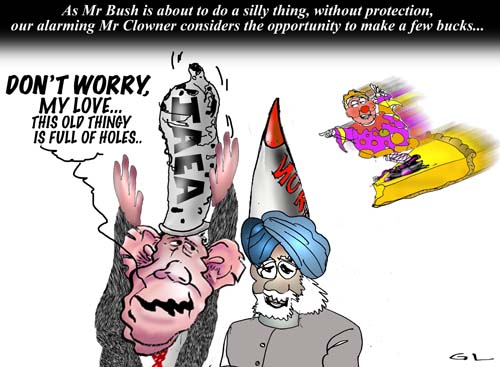Search
Recent comments
- heat....
41 min 32 sec ago - economic warming....
2 hours 16 min ago - hate-ish....
2 hours 57 min ago - the new mood....
3 hours 24 min ago - devingels....
3 hours 30 min ago - cyprus capers....
4 hours 58 min ago - quack....
5 hours 10 min ago - prepare....
5 hours 16 min ago - for sale....
10 hours 13 min ago - SKYD AF!!!
10 hours 50 min ago
Democracy Links
Member's Off-site Blogs
the value of fishnets .....

This week Australian Foreign Minister Alexander Downer said Australia might sell uranium to India, despite the country not signing up to the Nuclear Non-Proliferation Treaty.
Federal Cabinet is to consider the issue in the next few weeks.
- By Gus Leonisky at 28 Jul 2007 - 7:21pm
- Gus Leonisky's blog
- Login or register to post comments
hail the Reds under the beds of nails...
By Robin Wright and Rama Lakshmi Washington Post Staff Writers
Tuesday, October 16, 2007; Page A01
A controversial nuclear deal between the United States and India appears close to collapse after the Indian prime minister told President Bush yesterday that "certain difficulties" will prevent India from moving forward on the pact for the foreseeable future.
The main obstacle does not involve the specific terms of the agreement but rather India's internal politics, including fears from leftist parties that India is moving too close to the United States, according to officials and experts familiar with the deal. Besieged over the past two months by growing opposition to nuclear energy cooperation with the United States, Prime Minister Manmohan Singh indicated over the weekend that he would rather save his coalition government than the nuclear pact.
----------------
Gus: will Aussieland under Johnee-baby still sell Uranium to the subcontinent? Bummer...
No call-centres in Ghoorpati...
Dying of hunger in Indian state
By Geeta Pandey
BBC News, Kushinagar, Uttar Pradesh
Jatai, a resident of Ghoorpatti village in the northern Indian state of Uttar Pradesh, lost five members of her family, one after another, over a period of about 18 months.
She says they all died from hunger.
"We have no land. When we don't get any work, we have nothing to eat. My husband died because he couldn't get any work. We had no food for seven to eight days," she said.
Srinivas Musahara, only about 19-years-old, died in August 2006 in Benwalia village. His neighbours say he hadn't eaten anything for 20 days.
Mother Kanti too looks famished and shrunken. She's so weak she is barely able to stand even to speak to me.
---------------------
lax nucularoo no pacem
US approves Indian nuclear deal
The US Senate has approved a nuclear deal with India, ending a three-decade ban on US nuclear trade with Delhi.
The 86-13 vote was the last legislative hurdle in a process that began when an agreement was reached in 2005.
The deal will give India access to US civilian nuclear technology and fuel in return for inspections of its civilian, but not military, nuclear facilities.
India says the accord is vital to meet its rising energy needs. Critics say it creates a dangerous precedent.
----------------
see old tired toon at top...
more mushroom soup...
What fallout from Indian nuclear deal?
By Paul Reynolds
World affairs correspondent, BBC News website
The nuclear deal between the United States and India raises major questions about the spread of nuclear weapons as well as illustrating India's new importance as a strategic American partner.
The deal was finally agreed by the US Senate on Wednesday, having previously been given approval by the UN's nuclear watchdog, the International Atomic Energy Agency (IAEA).
Under it, India is now able to receive supplies and technology for its growing nuclear power industry, ending a boycott imposed by nuclear supplier states (through the Nuclear Suppliers' Group) because it has not signed the Nuclear Non-Proliferation Treaty.
India can keep and develop its nuclear weapons programme, but has to open up certain of its nuclear power plants to IAEA inspection.
see toon at top and stuff...
---------------
India eyes France nuclear accord
Indian Prime Minister Manmohan Singh is in France where he will discuss boosting civilian nuclear trade.
Mr Singh meets President Sarkozy in Paris on Tuesday and says they could sign a nuclear co-operation agreement.
The trip comes after the US House of Representatives voted in favour of a landmark India-US nuclear accord.
Earlier this month, the Nuclear Suppliers Group (NSG) lifted a ban that had denied India access to the international nuclear market.
Rice set for India nuclear talks
US Secretary of State Condoleezza Rice has arrived in India for talks on a civil nuclear co-operation deal.
The US Senate approved the deal on Wednesday, ending a three-decade ban on nuclear trade with Delhi.
But Ms Rice said there were "a lot of administrative details" to be sorted out before it could be signed.
India says the deal is vital to meet civilian energy demands, but critics say it undermines efforts to control the spread of nuclear weapons.
Speaking on her way to Delhi, Ms Rice said it was not certain whether she would sign the deal on her visit.